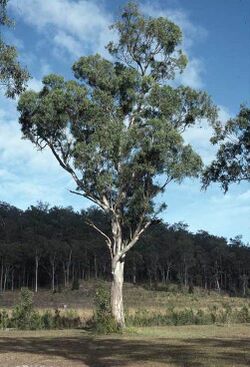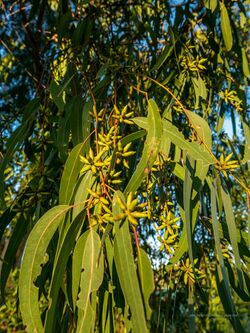Biology:Eucalyptus seeana
| Narrow-leaved red gum | |
|---|---|

| |
| Scientific classification | |
| Kingdom: | Plantae |
| Clade: | Tracheophytes |
| Clade: | Angiosperms |
| Clade: | Eudicots |
| Clade: | Rosids |
| Order: | Myrtales |
| Family: | Myrtaceae |
| Genus: | Eucalyptus |
| Species: | E. seeana
|
| Binomial name | |
| Eucalyptus seeana Maiden[1]
| |
| Synonyms[1] | |
| |
Eucalyptus seeana, or narrow-leaved red gum,[2] is a species of small to medium-sized tree that is endemic to eastern Australia. It has smooth bark, lance-shaped adult leaves, flower buds in groups of between seven and eleven, white flowers and hemispherical fruit.
Description
Eucalyptus seeana is a tree that typically grows to a height of 40 m (130 ft) and forms a lignotuber. Young plants and coppice regrowth have dull, greyish green leaves that are linear to lance-shaped, 50–120 mm (2.0–4.7 in) long and 8–20 mm (0.31–0.79 in) wide and petiolate. Adult leaves are arranged alternately, the same shade of green on both sides, narrow lance-shaped to lance-shaped, 100–180 mm (3.9–7.1 in) long and 10–25 mm (0.39–0.98 in) wide, tapering to a petiole 10–22 mm (0.39–0.87 in) long. The flower buds are arranged in leaf axils in groups of seven, nine or eleven on an unbranched peduncle 5–13 mm (0.20–0.51 in) long, the individual buds on pedicels 2–6 mm (0.079–0.236 in) long. Mature buds are oblong to spindle-shaped, 10–16 mm (0.39–0.63 in) long and 3–5 mm (0.12–0.20 in) wide with a horn-shaped operculum 7–12 mm (0.28–0.47 in) long. Flowering has been observed in November and December and the flowers are white. The fruit is a woody, hemispherical capsule 2–5 mm (0.079–0.197 in) long and 5–8 mm (0.20–0.31 in) wide with the valves protruding strongly.[2][3][4]
Taxonomy and naming
Eucalyptus seeana was first formally described in 1904 by Joseph Maiden in the Proceedings of the Linnean Society of New South Wales.[5][6] The specific epithet honours John See.[6]
Distribution and habitat
The narrow-leaved red gum mostly grows as scattered individuals in forest and occurs from near Caloundra in Queensland to near Telegraph Point in New South Wales.[3][4]
Conservation status
The population of this species in the Taree LGA is listed as an "endangered population" and is threatened by habitat fragmentation, weed invasion and forestry activities.[7] In Queensland it is classified as "least concern" under the Nature Conservation Act 1992.[8]
References
- ↑ Jump up to: 1.0 1.1 "Eucalyptus seeana". Australian Plant Census. https://biodiversity.org.au/nsl/services/apc-format/display/76598.
- ↑ Jump up to: 2.0 2.1 K.Hill. "New South Wales Flora Online: Eucalyptus seeana". Royal Botanic Gardens & Domain Trust, Sydney, Australia. http://plantnet.rbgsyd.nsw.gov.au/cgi-bin/NSWfl.pl?page=nswfl&lvl=sp&name=Eucalyptus~seeana.
- ↑ Jump up to: 3.0 3.1 "Eucalyptus seeana". Euclid: Centre for Australian National Biodiversity Research. https://apps.lucidcentral.org/euclid/text/entities/eucalyptus_seeana.htm.
- ↑ Jump up to: 4.0 4.1 Chippendale, George M.. "Eucalyptus seeana". Australian Biological Resources Study, Department of the Environment and Energy, Canberra. https://profiles.ala.org.au/opus/foa/profile/Eucalyptus%20seeana.
- ↑ "Eucalyptus seeana". APNI. https://id.biodiversity.org.au/instance/apni/455120.
- ↑ Jump up to: 6.0 6.1 Maiden, Joseph (1904). "On four new species of Eucalyptus". Proceedings of the Linnean Society of New South Wales 29 (3): 469–472. doi:10.5962/bhl.part.20168. https://www.biodiversitylibrary.org/item/30005#page/511/mode/1up. Retrieved 20 December 2019.
- ↑ "Eucalyptus seeana population in the Greater Taree local government area - profile". New South Wales Government Office of Environment and Heritage. https://www.environment.nsw.gov.au/threatenedspeciesapp/profile.aspx?id=10316.
- ↑ "Eucalyptus seeana". WetlandInfo. Queensland Government. https://wetlandinfo.des.qld.gov.au/wetlands/ecology/components/species/?eucalyptus-seeana.
Wikidata ☰ Q15355375 entry
 |


